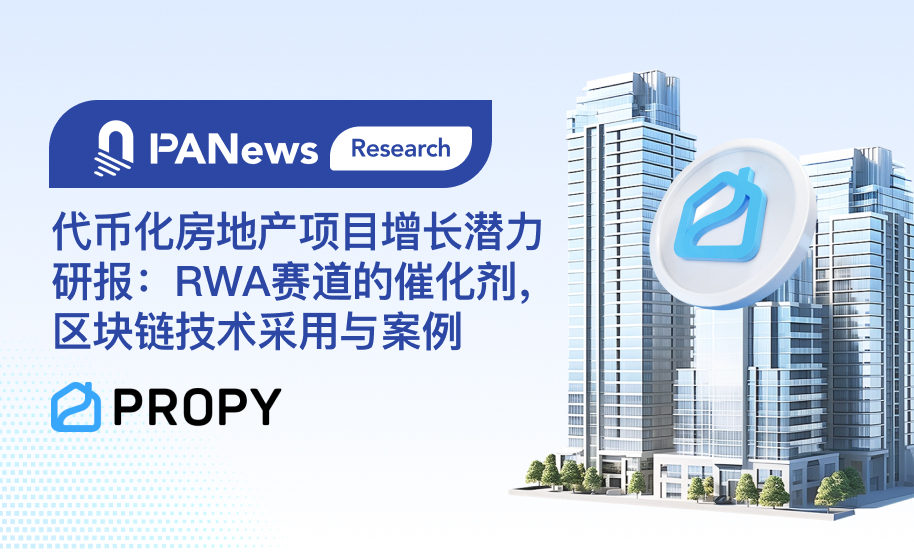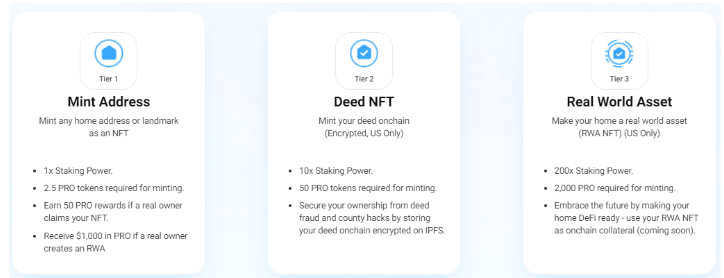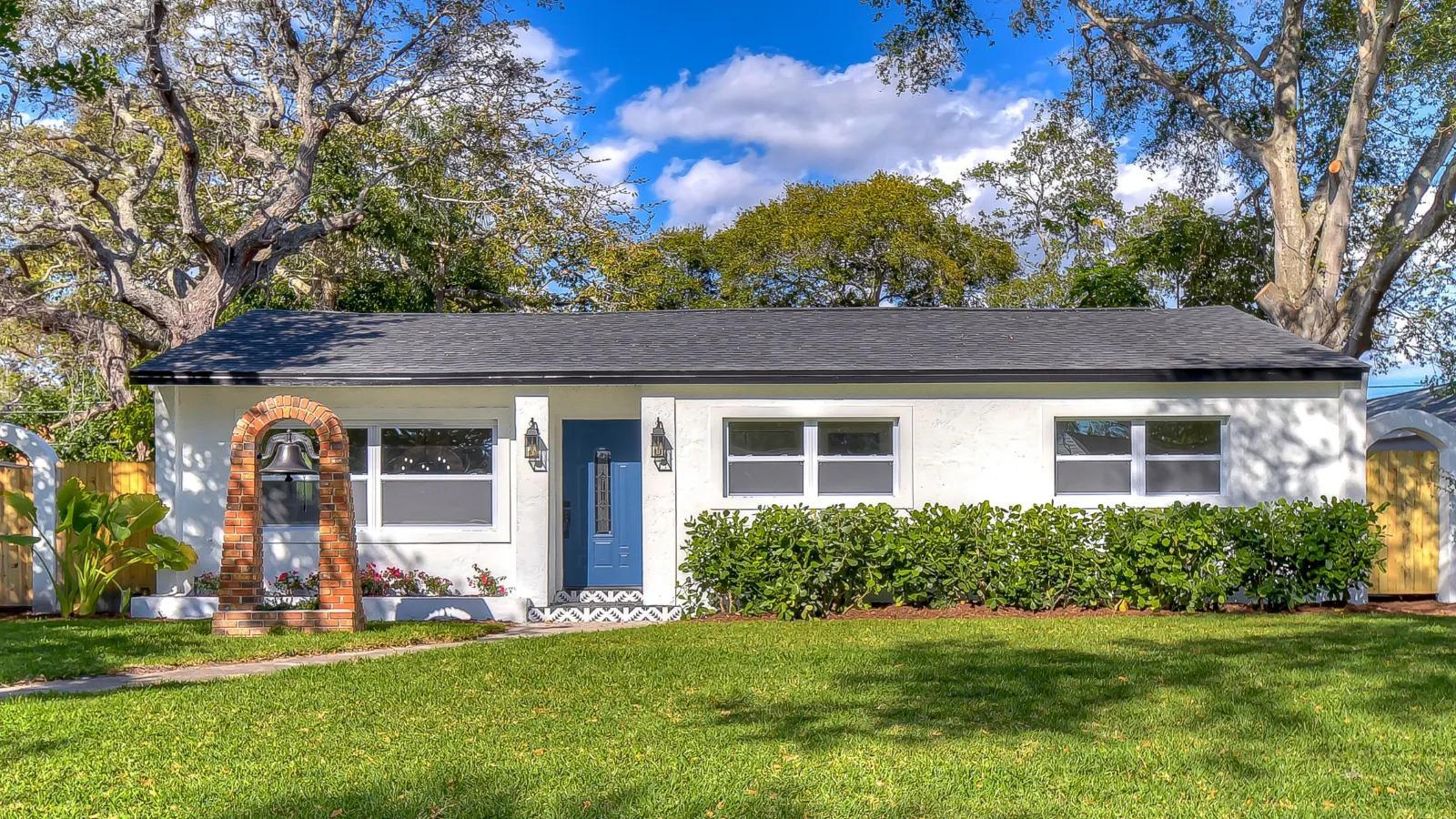
Author: Weilin, PANews
The real estate industry holds significant influence and status worldwide. According to Statista, the global real estate market is expected to reach an impressive $634.90 trillion by 2024. Looking ahead, the industry is projected to grow at an average annual compound growth rate (CAGR) of 2.77% from 2024 to 2029, with the market size reaching $727.80 trillion by 2029.
Despite this, the traditional real estate transaction process has many limitations, such as lengthy procedures, excessive reliance on intermediaries, and vulnerability to fraud risks. With the rise of blockchain technology, this landscape is facing disruption. Blockchain technology significantly enhances the transaction process, costs, and security of real estate through innovations like distributed ledgers, smart contracts, dynamic NFTs, and tokenization. These advancements have the potential to simplify property ownership processes, reduce fraud, and create more convenient investment opportunities for global users.
In the future, due to the expansion of technologies like blockchain and artificial intelligence (AI), the real estate transaction process may be greatly shortened, potentially completed within a day. These innovations are fundamentally transforming the industry by automating processes, increasing transparency, and enhancing efficiency at every stage. Financialization and disintermediation will radically change the traditional real estate market, bringing the liquidity of real estate assets closer to that of the stock market.
Previously, PANews introduced the star real estate project Propy in the RWA track and its core product PropyKeys, as well as how they address traditional real estate transaction pain points to make transactions safer and more convenient. This research report will take Propy and the recent collaboration with the decentralized oracle network Chainlink on integrating Automation as an example to analyze the trend of tokenized real estate and its growth potential.
01 Current Pain Points in the Traditional Real Estate Industry
Due to the high costs and lengthy processes associated with purchasing homes, as well as reliance on numerous intermediaries, investors, buyers, and sellers are demanding transparent, one-click processes that meet the needs of their era. The Propy team believes that the traditional real estate transaction process is long, cumbersome, and primitive, with the following issues:
It can take weeks or months to find a suitable buyer or seller
Buyers and sellers often struggle to obtain accurate and complete information during the transaction process, relying heavily on intermediaries. This information asymmetry increases the complexity and uncertainty of transactions, affecting market fairness and transparency.
The intermediary process is cumbersome, involving too many manual processes and stakeholders
These stakeholders include buyers, sellers, intermediaries, banks, lawyers, and government agencies. Each stage requires extensive paperwork and verification procedures, leading to a cumbersome and time-consuming process. This inefficiency is particularly evident in the U.S. market and cross-border transactions, where prolonged transaction times and high costs present significant challenges.
Heavy operational workload
Due to the lack of programmability of real assets, a substantial amount of operational work is required to ensure the execution of contracts, transactions, payments, and more.
High security risks, vulnerable to fraud, data breaches, and other security threats
Fraud in the real estate sector is significant, involving large sums of money. According to the FBI's Internet Crime Complaint Center (IC3), the agency received 9,521 complaints related to real estate in 2023. While this number may not seem large, the losses from these crimes totaled $145,243,348 (a figure that exceeds losses from identity theft, ransomware, malware, and many other types of crime).
02 Solution: The Combination of Blockchain Technology and Real Estate, PropyKeys Introduces Dynamic NFTs
Propy officially launched PropyKeys in March this year, allowing users to mint digital addresses and contracts for real-world properties, aiming to put 1 million home addresses on-chain by 2025. Its additional features include AI-generated landmark NFT minting and a novel staking mechanism designed to create a gamified experience, making home ownership more accessible, secure, and interactive.
Dynamic NFT Technology
Dynamic NFTs are a way to tokenize real estate assets. Owning an NFT can be equivalent to owning the real estate, and transferring the NFT can signify a change in property ownership. NFTs can hold and automatically update key data, facilitating information exchange between the parties involved in the transaction, such as home improvements, renovations, and past sales. Over time, dynamic NFTs become more useful. For example, an NFT can store images or videos of a property, showcasing its condition at a specific point in time. With multiple ownership changes, the continuously added videos/images allow buyers to see how the property has changed over time, providing deeper insights for their purchasing decisions. By adopting dynamic NFT technology, not only can the transaction process be expedited, but security can also be enhanced.
PropyKeys utilizes dynamic NFT technology, featuring three tiers that adopt different strategies for different users. The first tier signifies that users perform basic address minting, proving asset ownership. The second tier indicates that users upload proof of property ownership documents, ensuring that their property contracts cannot be tampered with under any circumstances, thereby enhancing asset security. At the third tier, users can expedite the buying or selling process, using NFTs as collateral to achieve 100% RWA. This gradual upgrade increases user engagement, making it easier for them to understand the complex applications of real estate combined with RWA.


Simple Tokenized Real Estate (NFT), Representing Individual Real Estate Assets as NFTs
The characteristic is that owning an NFT can be equivalent to owning real estate, and transferring the NFT can signify a change in property ownership. NFTs can contain key data, such as past sales records, addresses, etc. Theoretically, selling a house could be as simple as listing it on an NFT marketplace. Buyers just need to click a few buttons, and if they have sufficient funds, they can complete the purchase within minutes—this stands in stark contrast to the current real estate transaction process, which takes weeks.
In 2022, the first real estate-backed NFT in the U.S. was sold on the Propy platform for over $653,000 in ETH.

In 2022, Propy sold its first NFT-backed property in the U.S., located in Gulfport, Florida.
Further Tokenization: Fractional Real Estate Ownership (Fungible Tokens)
Another way to tokenize real estate is through fractional ownership, which allows for partial ownership of real estate using fungible tokens (FT).
Each token can represent a specific percentage of property ownership. Owning all fungible tokens is equivalent to owning the entire property. Fractional real estate allows buyers to purchase a small portion of a property, making real estate more accessible.
With thoughtful design, fractional real estate tokens can enable investors to build customized real estate asset portfolios, allowing potential homebuyers to gradually achieve their goal of living in and owning their ideal property, while businesses can develop customized real estate products.
Tokenized Real Estate Cash Flow and Tokenized Real Estate Asset Baskets
In this "tokenized real estate cash flow" model, property owners can separate property ownership from cash flow ownership. Cash flow rights (typically monthly rental income) can be sold as a whole to other parties for a specific period. Tokenized real estate cash flow can provide property owners with additional options and reduce the cost of property ownership.
Additionally, a real estate asset basket can be created. Fungible tokens can collectively represent all properties and cash flows, with cash automatically flowing to token holders.
The key benefit of using a tokenized large-scale real estate basket is the ability to provide trust-minimized guarantees and execute automatically based on verifiable data. On-chain ownership of real estate and cash flow can achieve higher verifiability of the underlying collateral (properties and their cash flows), enable automatic payments, and enhance transparency regarding asset health.
03 Case Study: PropyKeys and Chainlink Collaboration, Integrating Automation on PropyKeys
In April 2024, PropyKeys integrated Chainlink Automation on the Base network to distribute staking rewards. As of September 14, PropyKeys has minted 276,284 addresses.
From the technical background of Automation, smart contract functions cannot be triggered automatically and require an external party to send an on-chain transaction to execute the contract functions. The method commonly used by automated market maker (AMM) protocols is to initiate transactions from the user side to wake up the contract; while many other smart contracts use external parties, commonly referred to as "keepers," to monitor whether predefined conditions are met and trigger on-chain contracts when conditions are satisfied. The predefined conditions can be a specific time point, an event, or a complex off-chain calculation.
Before keeper services emerged, smart contract development teams had to rely on centralized servers or DevOps teams to manually trigger contracts. However, this not only risks a single point of failure for the protocol but also wastes valuable resources that should be used for developing underlying business logic or functionalities on DevOps.
Chainlink Automation acts like a decentralized trading automation bot, allowing smart contracts to run automatically. Developers can submit custom tasks to Chainlink Automation, detailing the functions of the smart contracts and calling these functions based on specific conditions. Automation monitors whether these conditions are met through secure off-chain computations and triggers the function to run when conditions are satisfied. Ultimately, developers can effectively enhance the operational robustness of decentralized applications, reduce development costs, simplify user experiences, create feature-rich hybrid smart contracts, and ensure end-to-end automated operations.
After integrating Automation into PropyKeys, Chainlink Automation allows developers to automate key on-chain functions at set time intervals or in response to external events. Based on Chainlink Automation, Propy has achieved highly reliable, high-performance, and decentralized automation, enabling transactions to be quickly identified and confirmed even during periods of severe network congestion.
Time-tested infrastructure helps Propy save costs: eliminating internal automation infrastructure costs, reducing resources used for DevOps, and increasing speed and efficiency.
Propy can achieve faster scaling: quicker scaling avoids the challenges of building and maintaining reliable automated multi-chain infrastructure. At the same time, it unlocks new use cases and more features.
Currently, Chainlink's oracle network securely supports over $16 trillion in on-chain transaction value.

04 Challenges and Future Development Trends of Tokenized Real Estate
Challenges from Regulation and Users
Despite the positive momentum and growth potential in the tokenized real estate track, there are still challenges in real-world deployment that test the participating projects and developers.
Regulatory considerations across different jurisdictions are a significant issue. Any tokenization project must comply with local laws and regulations. When tokenizing RWAs in the real estate sector, liquidity, market infrastructure, data security, transparency, standardization, and interoperability are some key challenges. Although there are many significant obstacles to tokenizing real estate, Propy is actively working to address these issues.
To enhance compliance, Propy has integrated KYC (Know Your Customer) and AML (Anti-Money Laundering) checks into its platform to verify the identities of all participants. The company also collaborates with legal experts to ensure that its tokenization processes comply with relevant real estate and securities regulations. Propy's platform is designed to be flexible and adaptable to different jurisdictions to ensure compliance with various legal requirements.
Additionally, Propy leverages blockchain technology to create secure, tamper-proof transaction records. By storing real estate data and ownership records on a decentralized ledger, Propy enhances transparency and reduces the risk of fraud. The platform also implements advanced security protocols to protect user data and transaction information.
Furthermore, there are challenges in the mass adoption of RWAs, user education, and changing user behavior. To address this, Propy's focus in 2024 will be on community engagement and education, frequently hosting webinars and workshops while working to develop partnerships with collaborators such as Base, Coinbase, Parcl, and Chainlink. In this way, Propy helps real estate professionals and ordinary customers better understand blockchain technology and its future potential in the real estate sector.
Trends in the RWA Track: Asset Class Diversification and Scalability
1) Asset Class Diversification
As RWA tokenization develops, the asset classes will become increasingly diverse, covering commercial real estate, industrial real estate, and real estate financial assets. This also includes tokenized funds involving short-term financial assets such as short-term government bonds, repos, commercial paper, etc. Additionally, private credit and supply chain finance are gradually becoming new areas of expansion. In the future, it is expected to extend to housing mortgages, construction loans, bridge financing, and securitized products, further enriching the types of assets.
2) Scalability
Incorporating DeFi elements into real estate tokenized assets greatly enhances their scalability. Staking and re-staking, derivatives in the secondary market, indices, and hedging strategies create more liquidity and financial innovation space for real estate-related token assets, promoting deep integration between traditional finance (TradFi) and decentralized finance (DeFi) in search of more liquidity solutions.
3) Future Possibilities Including Commodities, Artwork, and Intellectual Property
The tokenization of real estate and private credit is just the beginning. In the future, we can expect other asset types, such as commodities, artwork, and intellectual property, to gradually achieve tokenization. Even products like ETFs/ETPs are expected to emerge in the wave of tokenization, further enriching investors' choices.
In the future, as challenges are gradually resolved and the popularity of real estate RWAs increases, the speed of real estate transactions will significantly improve, potentially completing transactions within a day, greatly simplifying the transaction process. In asset management, digital transformation will accelerate, such as the gradual popularization of warehousing information management. Financialization and disintermediation will fundamentally change the traditional real estate market, bringing the liquidity of real estate assets closer to that of the stock market, pushing the entire industry into a new stage of development.
References:
https://x.com/i/spaces/1lDxLlwaOgQxm
https://chain.link/education-hub/tokenized-real-estate
https://www.panewslab.com/zh/articledetails/9e8inlra.html
免责声明:本文章仅代表作者个人观点,不代表本平台的立场和观点。本文章仅供信息分享,不构成对任何人的任何投资建议。用户与作者之间的任何争议,与本平台无关。如网页中刊载的文章或图片涉及侵权,请提供相关的权利证明和身份证明发送邮件到support@aicoin.com,本平台相关工作人员将会进行核查。



